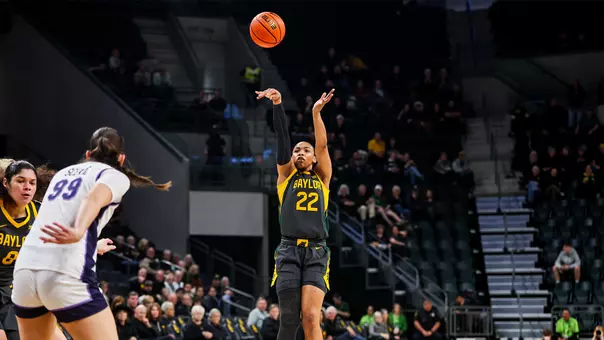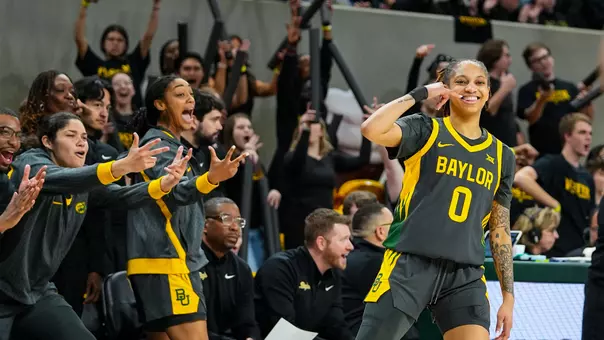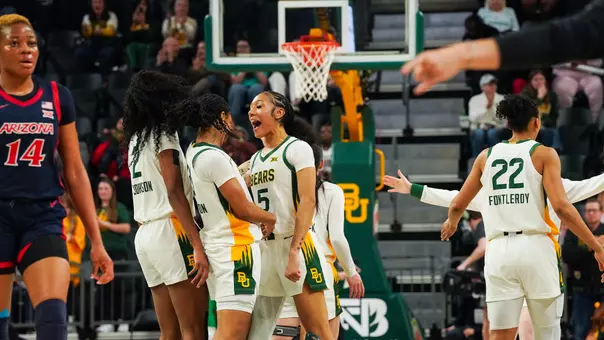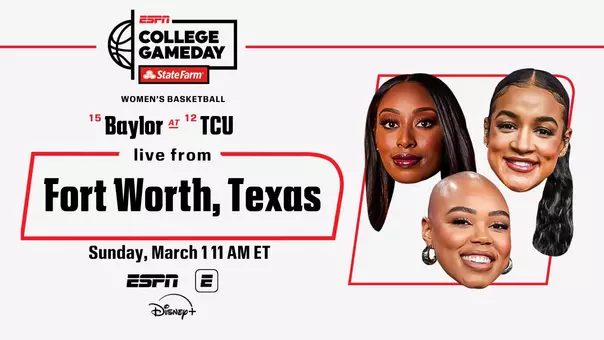Getting to Know New Lady Bear Hoops Coach Richard Barron
8/1/2007 12:00:00 AM | Women's Basketball
Aug. 1, 2007
What attracted you to this position at Baylor?
"There are a lot of things that attracted me to the position. I think professionally speaking it was a chance for me to coach in the Big 12 with a Hall of Fame head coach. It's a step in my career that I skipped; I became a head coach at 26. I did not have a lot of mentoring in terms of working under people. I kind of learned the hard way about things so this will be a good experience for me. I can see different ways to do things after several years. Just take a step back, observing another way of getting things done.
The Big 12 is such a great conference, so competitive. I think we've got a great chance to win national championships here and that's something we all aspire to, but very few people are in a position to do. I want to be able to do that in my career so this was an opportunity to do that.
It's also a great situation for me, Waco's a great family town, and Baylor's a great university. In addition, just the way the schedule's work out, it's going to be a better situation for me as a father and a husband. Life as dual head coaches at Princeton where our schedules became difficult. It was more than just demanding, the schedules were almost impossible to manage."
Since you've touched on your family, tell us about them:
"Well I have a wonderful wife Maureen Davies Barron (bio at end of article). She played softball at Princeton, she's Canadian. She played for Team Canada in softball and was a very successful player at Princeton. I met her my first or second day at work when I was getting ready to go take the NCAA recruiting exam. We started dating and I fell for her pretty quickly. Six months later, I proposed on New Years Eve and we were married the next September. A little over a year later we had twin girls Lane and Rae, Dorothy Lane and Katherine Rae are their full names, but we call them by their middle names. Then we had a son Billy in August of 2006."
What has been your biggest adjustment so far?
"There are probably two or three things. The rain. All kidding aside, getting used to all this wet weather here has been an adjustment. Of course, there's going to be the adjustment of going from being the head coach to being an assistant. And there's an adjustment period for me right now of being away from my family until we get the move made. But, they're not major adjustments.
Philosophically I believe I'm going to be right in line and step with Kim, so it will be very easy to make that transition. I'm here to support her and the program and I'm really excited about that. Some of the things, you change schools, you change departments, everyone has a different way of doing things so there's a little bit of learning to do on the fly. But, I don't think it'll be quite the adjustment that everybody anticipates it being.
As far as being away from the family, it's the travel back and forth. And, at this time of the year, there are things that I'm used to doing that now I'm not in a position to do. But that's all right with me. Whatever's going to help us win, I'm willing to do."
What is your coaching philosophy?
"I think broadly speaking, coaching is an educational process. I like to think it's more than just basketball; we are contributing to the development of the student-athlete. We're teaching them life lessons, things that are going to help them down the road. Obviously, competitive athletics ends at some age and for most, it ends after high school. For some, including the kids here there is the opportunity to play professionally. But, even that lifetime is not a long one, so what do they learn, what do they take with them, what values. I really do believe in teaching through basketball. Then I think it's a team game, I personally enjoy the melding of parts, the bringing everyone together. The old acronym `together everyone achieves more.' That's really a big thing for me.
In terms of more specifics, I have different philosophies. I'm almost like a liberal arts basketball coach. There's a lot of different ways to skin a cat in basketball. You can run, you can slow it down, you can play a more spread offense, you can do a lot more set plays, any of those things can be successful. For me the challenge is to figure out what the personality types are, what the skill sets are of the players and adapting the system to them instead of maybe the other way around of trying to fit the players into a system. I like the idea of being a little bit versatile in that regard.
There are certain fundamentals that I believe in and there are some universal truths. One is that you play hard, just flat out try to outwork your opponent. Work ethic is really, really important to me, it's almost an issue of integrity. The unselfishness aspect is another important value. Sacrifice whatever it is you need to sacrifice in order to help the team the best. One of my favorite quotes is an old Chinese proverb `for the raindrop joys entering the river.' I entertain the philosophy of being a part of something greater than yourself; the raindrop loses part of its identity when it becomes part of the river. And that to me is kind of the sum of my philosophies."
What are some of your strengths?
"I think tactically, being able to see the game and process space and time. Those are things that I see and understand and get very quickly, it doesn't take me long to figure those things out. I think evaluating talent and recognizing the intangibles are also a strong point of mine; what someone has, what they can do, what someone can't.
There's an author named Malcolm Gladwell who wrote the book "Blink: The Power of Thinking Without Thinking," he also wrote "Tipping Point: How Little Things Make a Big Difference." Both are fantastic books. "Blink" is about our ability to process things instantly and our own prejudices and how those things to shape our thoughts. I think that is indicative of where some of my talents are. I am able to make quick decisions about people and usually be right on."
What have you been most impressed by so far?
"These are tough questions because there's not a most, there are many. We're sitting in this office, the facilities are great. I'm impressed with the staff. Kim's dynamic leadership and her knowledge of the game. Damion's (McKinney) impressed me with the connections he has in recruiting, Jennifer (Roberts) has impressed me with her ability to multitask and manage many different things. She's heavily involved in recruiting and very involved in other aspects of the program. Johnny (Derrick) is a tremendous asset, he just keeps plugging away, he just gets it done. I'm impressed with the overall establishment of the program. I'm impressed with Debbie (Penney, administrative assistant) and all she does, I'm impressed with media relations, compliance, strength and conditioning, the training staff, it's endless. Another example is our great working relationship with the men's basketball program. And the overall success of athletics here. I think one of the things that stands out is how many times I've heard, unsolicited, people come up to me and say, `you know, Kim's the one who started all of this since women's basketball won the national championship. Now we believe we can win in anything.' The success we've had in softball, baseball, tennis, track and all of the other sports, a lot of that has come from seeing another team here win a national championship.
I'm very impressed with the people, the community, everybody's warm. The Lady Bear nation, people just coming to watch camp, just wanting to be around is impressive.
There are many but those are just kind of the ones that stand out."
What similarities do you see between Princeton and Baylor?
"Obviously, they're both very good schools. I think one of the things that stands out here is the Christian mission of Baylor, not being secular, not separating from the church and that's apparent, and in my case that's refreshing. I appreciate it and it's been a very comfortable environment for me to step into.
As a department, it's very different here. At Princeton we had 38 varsity sports, one of the largest athletic programs in the country. But, there was a student body of 4,500 students so almost a quarter of the student body was a varsity athlete. There are very different sort of ratios here. Over 14,000 students with 18 sports, very different proportionally."
What are your hobbies?
"Now they're my kids. Between my kids and my work, it's hard to have hobbies any more. I love playing golf; I love other sports and just being a fan. I ran marathons for a while until marriage and kids kind of sidelined that. For a good while, I was very into fitness. I really enjoy music, I enjoy reading, I enjoy learning, I follow politics and then often wonder why I waste my time. I think I have a pretty broad range of interests."
Closing comments:
"I'm really excited about a year from now, after kind of really settling in. Then I will know how things are working and see where I can best make the biggest impact or where my talents are best used. But I am so excited about this year and we've got a good young team coming back. We're excited about recruiting to Baylor and the momentum the program has. That's probably the biggest difference to me. Every place I've ever been I went somewhere they've really struggled, both on the men's and women's sides. They really needed a lot of energy in rebuilding. They were situations where you couldn't help but get better if you were doing things the right way. Then as we improved those programs, you had to start being more specific and tweak and change for who you're competing and recruiting against. But as I built those programs and set records I would take another rebuilding job and start all over.
This is such unfamiliar territory in that the expectations are high and you're not necessarily the underdog. And people are already interested, it's not having to talk them into what the future may bring; you're selling them on `we have won a national championship.' So, it's a very different perspective and I'm enjoying that. However, I think staying on top is just as hard as getting there."
Maureen Barron bio: Maureen Barron won four Ivy League titles during her seven seasons as head coach. All seven NCAA tournament appearances for the Princeton softball team have featured Barron as a coach or player.
Maureen Barron, then Maureen Davies, helped pitch Princeton into the 1995 and 1996 Women's College World Series, following the program's first NCAA tournament appearance in 1994.
A 1997 Princeton graduate, Maureen Barron became the head coach of the Tigers for the 2000-01 season after serving as a Princeton admissions officer and working as a graduate student at the University of Virginia following her undergraduate career. She was an assistant coach at Princeton for the 2000 season before becoming the head coach with the retirement of longtime mentor Cindy Cohen.
In 2002, Maureen Barron helped lead Princeton to the NCAA tournament for the first time since she was on the team in 1996. The Tigers returned to the NCAAs in 2003, 2005 and 2006.
During her seven-season tenure as head coach, Maureen Barron helped Princeton players win the Ivy League Player of the Year award twice, the Ivy League Rookie of the Year award three times and the Ivy League Pitcher of the Year award four times. In 2005 and 2006, Princeton pitchers captured both first-team All-Ivy pitching spots. Following Princeton's completion of the 2007 season, Maureen Barron's record as head coach was 196-149-1.



















